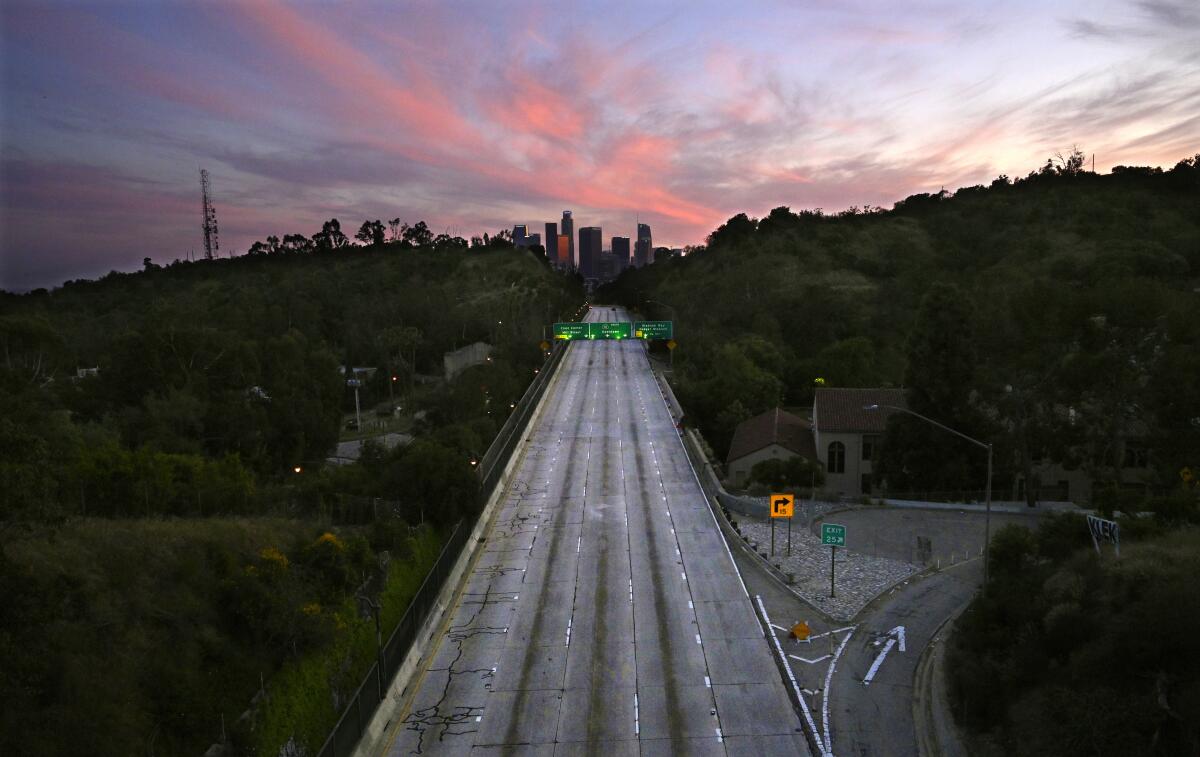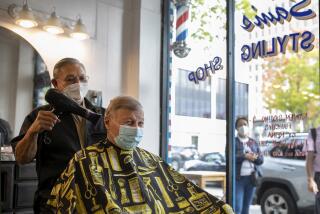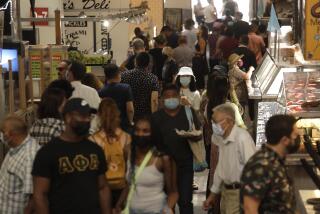A year ago we asked you to reimagine California after the pandemic. This is what readers say now

A little more than a year ago, California seemed on the path to pandemic success, if there could ever be such a thing. COVID-19 case counts and deaths remained low compared with the devastation in New York, and even though a projected state budget deficit threatened to unravel California’s safety net, Gov. Gavin Newsom was basking in what felt like universal praise for his early decisive actions shutting down much of the economy in service of saving lives.
So, in early May 2020, we asked readers to reimagine post-pandemic life in California, something that didn’t seem so far off. The response was overwhelming: Thousands of you sent us letters addressing racial and income inequality, environmental policy, urban design, education and other topics.
Then, on May 25, George Floyd was murdered. In June and July, California experienced a devastating surge in COVID-19 cases and deaths that would be dwarfed by a winter surge that nearly brought the state’s healthcare system to its knees and, for a while, turned Los Angeles County into the nation’s pandemic epicenter. Schools stayed closed.
Now, with the impending June 15 expiration of California’s pandemic restrictions thanks to high vaccination rates and low disease transmission, and with The Times Editorial Board’s recent series on the fundamental changes California needs to make to emerge from COVID-19 a stronger, more sustainable, more equitable society, we asked several readers who wrote to us in May 2020 to update their responses. Their letters are below, and they reflect the preponderance of opinions we’ve heard from readers throughout the pandemic — namely, that the state and federal governments need to take bold, progressive action, and that going “back to normal” should not be an option.
————————————
To the editor: In the early days of the pandemic, I wrote a letter to the L.A. Times saying that COVID-19 highlighted the need to address health disparities and injustices for Black and brown communities. That was before the pandemic and police violence sparked national conversations about racial justice across multiple fields.
My initial thoughts only scratched the surface of the real impact the pandemic would have on us over 14-plus months.
On June 15, California will “reopen.” I anticipate life after COVID — as exciting as it sounds — not being as rosy as expected for the communities most adversely impacted during this time: families experiencing homelessness and housing insecurity, the minority small business community, and those who have lost loved ones.
Systemic health disparities led to a gross number of deaths in the Black and brown communities. COVID-19 exposed our health injustices that clearly predated the pandemic but had gone under the radar until we could no longer ignore the body count. The numbers and demographics do not lie. America has another public health crisis: a crisis of access.
My hope is that post-pandemic, we will not return to business as usual but implement policies that eliminate the still-existing barriers to health coverage. Healthcare will be “essential” to our nation reopening and our communities thriving.
Najuma Smith-Pollard, Los Angeles
..
To the editor: Just like cicadas, we are eager to crawl out of our holes and leave behind a year of masking, constantly sanitizing our hands, panicking at every cough and, above all, seeing reality upstaged repeatedly.
But normal is not coming back. We have experienced a great deal of pain. It’s up to us whether this pain will become transformative.
COVID-19 laid bare some basic shortcomings of our society — for instance, it showed us that having health insurance, broadband internet access and a reliable income are necessary for maintaining our quality of life.
As we come out of our foxholes, we face the prospect of another “roaring twenties” decade. In it, we cannot forget the one silver lining of this pandemic: the potential of science and innovation. Our future hinges on research and development. We cannot afford to continue coasting through the first decades of this new millennium on the investments made by the generation that put humans on the moon.
Enrique Alberto Segura Carrillo, Sylmar
..
To the editor: Over the past year, conflicting directives, constantly changing reports, data manipulation, heightened fearmongering and censoring of alternative perspectives have created extreme distrust in the institutions previously relied on for truth. As we move into a post-pandemic world, it is my hope that if anything good comes out of the past year, it’s that being stripped down to our philosophical cores has allowed people a chance to question how they recognize truth.
I’m hopeful for a resurgence in teaching critical thinking skills so people will know to decipher and defend what they individually believe rather than just express blind allegiance to a prevailing narrative.
Ultimately, I believe that we must shift to a mindset of individual responsibility and personal choice rather than sweeping government control if we’re going to move forward productively. People must be able to choose the risks they are willing to take for their own lives.
I hope that we can go back to a world where we allow individuals to once again have responsibility to make their own risk assessments.
Ronni Peck, Sun Valley
..
To the editor: Now that a majority of eligible Californians have been vaccinated, people are clamoring to “go back to normal.” But the way we lived before March 2020 is not something to which I want to return.
Workers continue to be exploited by billionaires and executives through insultingly low wages and poor working conditions. The pandemic only exacerbated this, with large companies gaining billions of dollars in profit while resisting calls for employees to receive hazard pay for working in high-risk and high-stress environments. Meanwhile, many corporations don’t pay their fair amount in taxes.
Our housing shortage and homelessness crisis have also become more urgent during the pandemic. Hundreds of people moved back in with their parents or other family members because they couldn’t afford to live on their own. Our unhoused population faced extremely high COVID-19 risk. People living in overcrowded conditions were more at risk for COVID-19, especially when at least one member of the household worked in an essential industry.
Ultimately, our system is built to benefit the privileged and the wealthy. Those with less wealth and therefore less political power struggle to make ends meet while politicians and billionaires argue about their tax rates and pass laws that leave working-class people behind.
If we don’t make big changes, that’s the “normal” we’ll continue to face — and I’m not willing to accept that.
Jessamyn Garner, Huntington Beach
..
To the editor: In the early days of lockdown, the streets in my neighborhood were suddenly a ghost town. Looking down the middle of Sunset Boulevard at 5 p.m., I could see no cars for minutes at a time.
Then people started coming out on their bikes — more than I’d ever seen before, and I pay attention, because I’m a cyclist. I’ve been volunteering for several years with a community organization fighting for street and infrastructure improvements to make cycling safer and more comfortable for Angelenos, but it turns out that the sudden decrease in car traffic transformed L.A. in ways I could only have imagined.
Last summer I started to notice more street vendors on my block. An evening taco stand set up tables on the wide sidewalks with a spit of al pastor rotating in the flames. Food trucks parked along Sunset during the day, so I finally had somewhere to walk for a quick lunch as I was working from home.
The traffic returned pretty quickly, but I still see more cyclists than I used to.
Maybe I won’t be the only one returning to my office by bike. Maybe we can start valuing the street life that’s flourished in our empty parking spaces. Maybe we can start to see our streets as a destination, instead of just what you drive through to get somewhere else.
Karen Draper, Los Angeles
..
To the editor: Right now, with vaccinations increasing and new infections waning, it is easy to forget where we started.
It’s easy to forget the inadequacy of our government’s response, the racism that people of color fought against over the last year, and the swiftness with which we fundamentally changed how we live in the span of two weeks in March 2020.
I sincerely hope that we don’t return to the normalcy we had before, because that world was deeply flawed. The pandemic has shown me, and hopefully you, that immediate, rapid change to make the world the place we want to live in is possible within a lifetime, if not much sooner.
As an Asian American college student, I am incredibly frustrated to have seen many microaggressions against my classmates and acts of violence against our elders throughout the past year. It is also incredibly frustrating to see the very little real progress toward racial reconciliation since the George Floyd protests.
I feel that stereotypes have gotten in the way of productive conversations, and the thing with stereotypes is that they make it hard to live a life independent of them. At least for me, I feel that my whole life has been either a confirmation of or a rebellion against certain stereotypes of Asian Americans imposed on me, rather than a chance to actively create my own path.
Yes, I’m Asian American, but more fundamentally, I’m American. Let me do what Americans do; let me pursue my own dreams. We live in a society. Let’s make a society worth living in.
Alex Li, Camarillo
..
To the editor: A year ago, if you would have told me to predict how my life was going to change, I never would have guessed that I would be living with my partner in her home country of Guatemala, as I have been for the last eight months. Nothing will throw you out of your comfort zone like traveling to a country you’ve never been to with an open return date.
As my personal life took a complete left turn, I feel my priorities are changing with the pandemic. Now more than ever, I have a strong desire to be expressive. Pride means so much more to me than a rainbow-themed T-shirt from Target. I want to be proud not only as a queer person, but also proud to stand up for my beliefs, for others, and for our planet.
Now that I am planning to return to Los Angeles, I feel like I am going back to the future — and to the city that welcomes diversity on all levels, full of people who share the desire to create and celebrate change. Moving into a post-pandemic world, I am optimistic — not about returning to the way things were before 2020, but about the new world to come.
Elizabeth Gomez, Carson
..
To the editor: Last spring, in the depths of the pandemic, I felt almost desperate for us to seize the opportunity this crisis was giving us, to make substantive and foundational changes. After all, we had shown ourselves capable of transforming our behavior immediately to meet the common threat. Why not learn from that and harness our collective energies to move toward equity and sustainability?
We cannot return to business as usual, especially with an economic system that is so unequal and destroying us from within, and an ecological crisis now upon us that will only intensify. Those most affected by the pandemic need to be made whole. Service jobs have to pay better. Caregivers of all kinds deserve a living wage and benefits. Corporations and the wealthy must pay more in taxes.
It is not sustainable to live in an economy driven by consumption. We must do everything possible to move toward renewable energies and practices. The lockdown underscored how much we need the natural world for our sanity, but I worry we are just too attached to our lifestyles to care for our planet.
As the pandemic recedes, it’s clear that folks are ready to take up where they left off. I get it, but that will not get us out of this mess. I was naive to hope that we would emerge wiser and focused on the common good. My generation (baby boomers) has not set a good example. Will the ones coming up now show the way?
Tricia Keen, Ventura
..
To the editor: I’d love to see a society that takes science seriously. Last year, people killed one another with COVID-19 because some refused to listen to scientists’ pleas to wear masks. We died from denial of science.
The rapid delivery of safe and effective vaccines should surely have settled the matter. But no.
On some levels I’m sympathetic. Our medical system is adversarial, eyeing your wallet greedily and only half-listening to your woes. Now they come all unctuous claiming they have your best interests at heart. The toxic interplay of money and science undermines trust.
Then Jan. 6 happened. Was this a new low? Would this result in a great awakening to the virtue of facts and science?
The jury is still out, unfortunately. There is another issue we can test, far more urgent than even vaccine acceptance (where our adherence to the science will end the pandemic).
Climate change is the most glaring example of our continued failure to listen to science. We have an opportunity to decarbonize our economy without disrupting it. But will we as a society learn our lesson about listening to science? Will we act? Or will money and politics continue to win, while our civilization dies in denial?
Glenton Jelbert, Foothill Ranch
More to Read
A cure for the common opinion
Get thought-provoking perspectives with our weekly newsletter.
You may occasionally receive promotional content from the Los Angeles Times.











